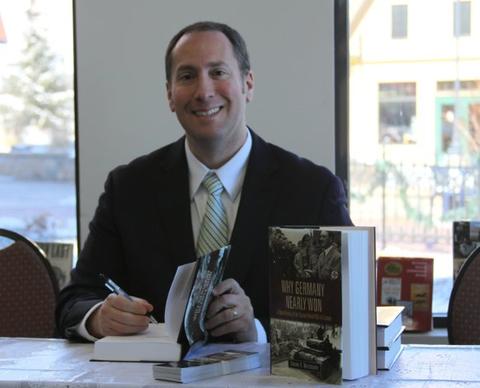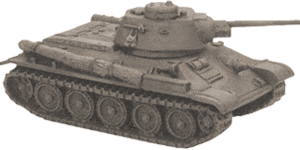New Interview with Why Germany Nearly Won Author Steven Mercatante

For those of you who don't know Why Germany Nearly Won: A New History of the Second World War in Europe is about to be published in the United Kingdom by Casemate. As such, Casemate recently interviewed author Steven D Mercatante regarding such topics as how he became interested in World War Two, whether he was nervous about challenging the conventional wisdom on the reasons for the outcome of the War in Europe, and more.
For instance, the interviewer asks "In contesting a widely accepted theory based upon the inevitability of Germany’s defeat, were you nervous of what the response would be from academics and the public?"
In response Mercatante answers:
"No – and here is why. I have been reading about World War II since I was very young. During these past thirty plus years of study I, of course, at first absorbed and accepted the conventional wisdom that the Axis, including Germany, were doomed to defeat from the get-go. This was because in large part because the Allies controlled the vast majority of the world’s territory, its population, and global economic output; which hence translated to immense military might.
Then, in the 1990’s I tracked with great interest the wealth of new information that has emerged from the Russian archives following the fall of the Soviet Union. This new documentation, though still leaving much unanswered, brought much needed clarity to the otherwise up to that point often vaguely described events on Germany’s Eastern Front (outside of certain exceptions such as the pioneering work of John Erickson). As I moved forward, and sought out ever more about the war, it became obvious to me that something was amiss in regards to the standard explanations as to the reasons for the outcome of the Second World War in Europe.
In short, the conventional wisdom that had evolved over time seemed to have constructed an overly simplistic, deterministic narrative for explaining one of history’s most complicated series of events – the Second World War in Europe. This narrative essentially reduced the war’s outcome to one easily explained as arising from the preponderant power produced by sheer Allied numbers; and for the most part found that once Germany decided to attack the Soviet Union and Barbarossa failed that it had essentially lost the war.
But this didn’t add up – so to speak – there was something not quite right. For instance, how did a quantitatively smaller, and often times technically inferior Wehrmacht (Nazi Germany’s combined armed forces), run circles around enemies with far more “brute force” strength in 1939-1942 but then lose the war in 1943-45 for reasons overwhelmingly attributed to brute force and mass. And obviously not everyone argued this. Take, for example, Richard Overy; who introduced other ideas for why the Allies won (but not the same ideas my work discusses in examining why Germany nearly won). I could list many more such questions raised and insufficiently answered by the conventional wisdom. But, for the sake of brevity the bottom line is that questions such as this led me to beginning a kind of epistemological study of the war to see if in fact what was conventionally considered the “truth” about the war actually matched up with the data. The outcome of this study then caused me to construct a qualitative vs. quantitative framework for analyzing the European war’s component events (with a focus on economic and military matters). This framework was one that I tested repeatedly against the best possible knowledge/data available about the war. The outcome of this study would ultimately develop into the three-pronged thesis for this book. A thesis which advances my belief that Germany very nearly did win the war – via coming extraordinarily close to securing the Soviet Union’s most important economic resources. This in turn could have fuelled a Nazi dominated European continent capable of effectively challenging the U.S. dominated North American colossus in either an enduring hot or cold war for global supremacy.
Because of the underlying research and methodology that led to my thesis (note that the thesis arose out of the study and not the other way around) I became confident that my overall ideas were worth exploring further and worthy of publication. What’s more, I felt like they were not only worth publication but stood up well against a conventional wisdom that even some modern historians, such as David Stahel, continue to parrot. Not incidentally, it is for these data driven reasons producing my thesis that I chose to organize this work in such a fashion as to lay out an overview of the entire war in Europe; with a heavy emphasis on analyzing the primary combatants in Eastern Europe (given that the war between Germany and the Soviet Union was the key to the Second World War’s outcome). From this overview I have interjected points gleaned from my qualitative vs. quantitative analysis into the best possible knowledge we currently have about the war as synthesized in my book. In this way a general reader can compare for themselves the actual facts/data against subsequent outcomes. From there the reader can decide for themselves if they find it plausible that “quality” had more of an impact on the war’s outcome than did “quantity”. And thus, if finding so, then the reader can decide from what is provided in this work whether or not Nazi Germany had an honest shot at securing its total dominance over Europe such that it could secure its existence as one of two global superpower’s; in effect winning the war. This book is actually an introduction into this conceptual framework that I have constructed for understanding the war in Europe and its outcome. Follow up studies will delve further into the nuts and bolts reasons why Nazi Germany, in spite of being grotesquely overmatched from a statistical balance sheet perspective, had everything it would need to secure Hitler’s Third Reich and challenge the U.S. for global supremacy.
I anticipate pushback, and welcome debate. However, regardless of my confidence in the strength of my findings, whether I am proven right or wrong is incidental. What is the point is that ultimately what emerges from this debate is the best possible knowledge (or to go back to the epistemological foundations of this study – “truth”) regarding why this extraordinarily important series of events in human history unfolded and ended in the manner which it did."
If you would like to know more about how Mercatante tested and developed his thesis, what are his favorite WWII subjects, or have an interest in the writing process than please see here for the entire interview.



Post new comment